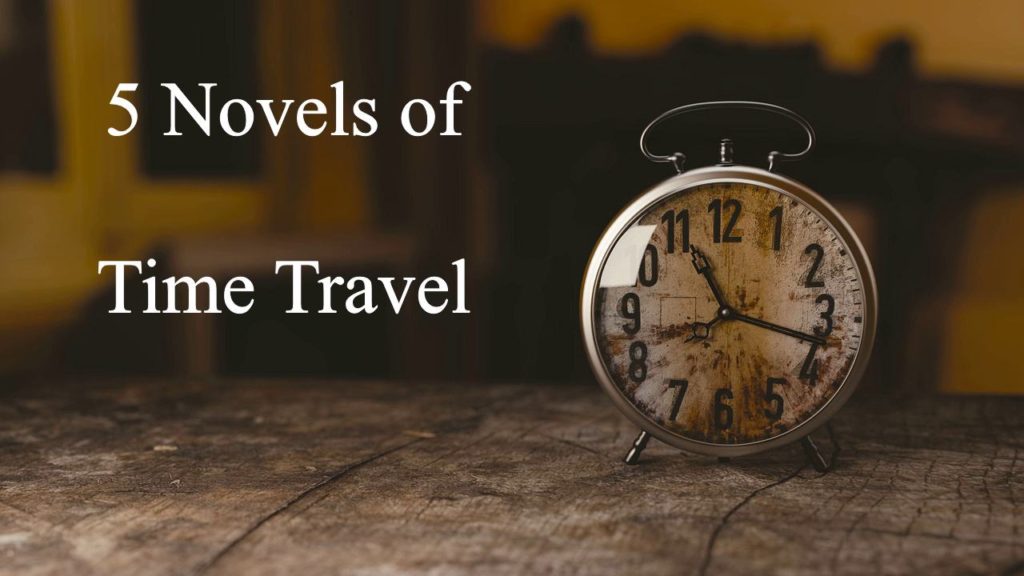The idea of time travel has fascinated artists, scientists, and historians for centuries. Authors have used the possibility of traveling through time to explore some of the big questions of human existence.
Here are five examples.
Time and Again by Jack Finney
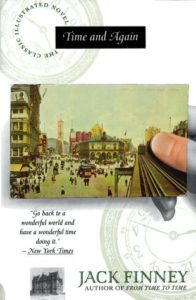 When a secret government organization recruits advertising artist Si Morley for its time travel experiment, Morley jumps at the chance. His friend has the remnant of a partially burned letter dated January 1882, and Morley intends to see what he can find out about the letter writer and intended recipient. One temptation of time travel is that travelers will like some other time period better than their own. When Morley falls in love with a woman from the world of 1882, he must decide exactly who he is and where he belongs.
When a secret government organization recruits advertising artist Si Morley for its time travel experiment, Morley jumps at the chance. His friend has the remnant of a partially burned letter dated January 1882, and Morley intends to see what he can find out about the letter writer and intended recipient. One temptation of time travel is that travelers will like some other time period better than their own. When Morley falls in love with a woman from the world of 1882, he must decide exactly who he is and where he belongs.
This 1970 novel is one of the most popular time-travel books, and its reputation is well deserved. Finney creates a compelling picture of life in New York City at the end of the nineteenth century and even makes time travel seem like a logical possibility. If you’re new to time travel literature, this novel is a good place to start.
The Time Traveler’s Wife by Audrey Niffenegger
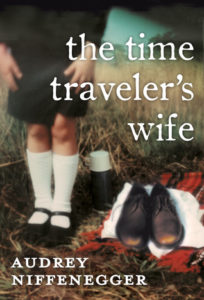 This novel uses time travel to present an unlikely love story. Clare and Henry are soul mates, but Henry suffers from a rare genetic condition that throws him into temporal free fall whenever he experiences a high-stress situation. Although Henry cannot control when he vanishes and to what time period he travels, he always lands at some point in his own life time—either his past, present, or future. And he almost always lands somewhere and somewhen near Clare.
This novel uses time travel to present an unlikely love story. Clare and Henry are soul mates, but Henry suffers from a rare genetic condition that throws him into temporal free fall whenever he experiences a high-stress situation. Although Henry cannot control when he vanishes and to what time period he travels, he always lands at some point in his own life time—either his past, present, or future. And he almost always lands somewhere and somewhen near Clare.
Much of the novel focuses on how both Clare and Henry learn to live with his unusual condition. But its emotional center is their love story, which transcends all the complications of their lives.
11/22/63 by Stephen King
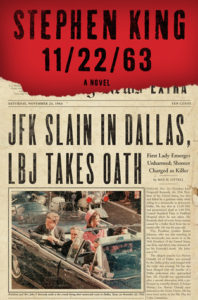 One of the most intriguing aspects of time travel literature is consideration of this question: What if someone could travel back in time and prevent some tragic disaster? This is the situation Jake Epping, a 35-year-old English teacher from Maine, encounters. Jake’s friend Al has discovered a portal back to 1958 in the rear of his diner. Al has been traveling back and forth, gathering information necessary to prevent the assassination of John F. Kennedy.
One of the most intriguing aspects of time travel literature is consideration of this question: What if someone could travel back in time and prevent some tragic disaster? This is the situation Jake Epping, a 35-year-old English teacher from Maine, encounters. Jake’s friend Al has discovered a portal back to 1958 in the rear of his diner. Al has been traveling back and forth, gathering information necessary to prevent the assassination of John F. Kennedy.
When Al’s failing health prevents him from finishing his mission, he recruits Jake to take up the cause. Using Al’s research, Jake settles into a life in 1958 Texas while planning to thwart Lee Harvey Oswald’s attack in Dallas. But like Si Morley in Time and Again, Jake discovers that life in another time period has potential complications. And even if Jake can stop the assassination, should he? What are the consequences of changing the past so drastically?
Kindred by Octavia E. Butler
 In 1976 in California, Dana, an African American woman, is suddenly pulled through time and plunked down in pre-Civil War Maryland. She saves a drowning white boy, only to find herself staring down the barrel of a shotgun. Just as her life is about to end, she is pulled through time once again and deposited back into her present life. Dana experiences several more of these time-wrenching experiences, always landing in the life of the same young man.
In 1976 in California, Dana, an African American woman, is suddenly pulled through time and plunked down in pre-Civil War Maryland. She saves a drowning white boy, only to find herself staring down the barrel of a shotgun. Just as her life is about to end, she is pulled through time once again and deposited back into her present life. Dana experiences several more of these time-wrenching experiences, always landing in the life of the same young man.
Octavia E. Butler was the first black woman to write science fiction, and this is her best known and most often studied novel. Butler won both Hugo and Nebula awards and in 1995 became the first science fiction writer to receive a MacArthur Foundation Genius Award. This novel uses time travel as a trope for exploring questions of cultural history and social justice.
Slaughterhouse-Five by Kurt Vonnegut
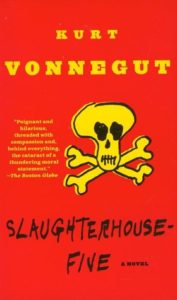 Billy Pilgrim has come unstuck in time.
Billy Pilgrim has come unstuck in time.
Focusing on the World War II fire-bombing of Dresden, Kurt Vonnegut examines the meaning of history and of human existence in what has become one of the most famous anti-war literary works of all time. This novel considers war not only as a broad, abstract concept of history but also as a human experience that affects all the people it touches.
No description can possibly do this novel justice. You must read it. It’s short, but you’ll continue to think about it for the rest of your life.
© 2017 by Mary Daniels Brown

